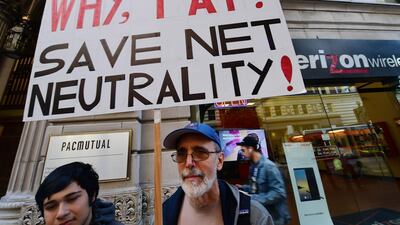US regulators are gearing up for a vote on a plan which — depending on your viewpoint — would "restore internet freedom" or, alternatively, result in "the death of the internet" as we know it.
The Federal Communications Commission will consider a rollback of its 2015 order aimed at enforcing "net neutrality," or the notion of treating all data and content providers equally.
FCC chairman Ajit Pai last month unveiled the plan, the latest twist in a dispute over more than a decade, with both sides claiming to promote a "free and open" internet.
The plan, widely expected to be approved on a 3-2 party-line vote Thursday, would reverse the rules adopted two years earlier which ban broadband providers from blocking or throttling rivals, or using "fast" and "slow" lanes for different services.
Pai, named chairman by President Donald Trump, said the 2015 rules "depress investment and innovation."
Critics of the existing rules say they rely on 1930s-era rules for telephone companies, which could in theory lead to price regulation and other burdens.
But net neutrality backers argue that the rollback will enable internet service providers (ISPs) to shut out rivals that compete with their services or those of partners. They point out that some ISPs in the past have tried to force users to their own search engines, or block online calling services such as Skype or Vonage, or require a premium for Apple's FaceTime video calling.
_______________
Read more:
The death of net neutrality may be just what the internet needs
Forget net neutrality, the internet needs data neutrality
_______________
The Pai proposal "will lead to a dramatic transformation of how the internet works," said Sarah Morris, who heads the New America Foundation's Open Policy Institute.
"Internet service providers as gatekeepers have a lot of incentives to engage in shenanigans. The threats to our ability to navigate the internet and go to every corner of it are at risk" if the Pai plan is adopted, she told a conference on Tuesday.
Michael Powell, head of the trade group for major broadband firms NCTA — The Internet & Television Association, said member companies have agreed to respect principles to "satisfy their customers' desire to visit any lawful website or run any lawful application."
But some are not mollified by these assurances, arguing that broadband is largely controlled by a handful of firms — including AT&T, Verizon and Comcast — with little competition or consumer choice in many markets.
The question of "paid prioritisation," whether broadband firms can charge more for improved access, has been among the most hotly debated.
Critics say broadband firms would be able to extort higher fees and limit access for new start-ups if the proposal is adopted.
But University of California economist Michael Katz argues this is a basic business principal at work.
"The logic of net neutrality would also argue for banning e-commerce sites from purchasing faster delivery from FedEx or UPS, or from offering free shipping," Katz said in a research paper.
The net neutrality battle has been the subject of a series of court challenges over the past decade, and more litigation is likely unless Congress establishes clear guidelines.
Large tech firms like Google, Facebook and Netflix oppose the FCC draft rules, arguing that ISPs could effectively cut off or limit user access to some services.
But with political and public sentiment shifting against Silicon Valley in recent months, Pai has turned the tables by blaming the large tech platforms for limiting consumer choice.
"These providers routinely block or discriminate against content they don't like," Pai told a recent conference.
Pai said his plan would "restore a light-touch" regulatory approach, while arguing that "some have tried to whip Americans into a frenzy by making outlandish claims."
Still, the FCC actions have sparked protests around the country, and some 21 million comments in its online system. But the comment system was tainted by what appeared to be "bots," possibly from Russia, repeating similar messages.
"The FCC is on course to eliminate net neutrality guided by a record corrupted by hundreds of thousands of filings with stolen identities (and) close to half a million comments from Russian e-mail addresses," said FCC commissioner Jessica Rosenworcel, who opposes the Pai plain.
"No vote should take place until a responsible investigation is complete."
An FCC spokesman said the vote "will proceed as scheduled on December 14."

